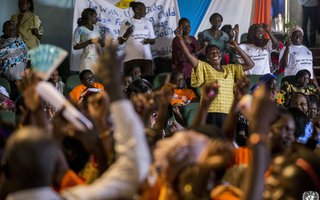November 2017

Research this month
Partnerships in conflict: How violent conflict impacts local civil society and how international partners respond
Acknowledging and unpacking the power asymmetries that often dominate partnerships between CSOs and international actors is an important first step towards building more enabling partnerships; this requires trust and honest conversations.
Partnerships in conflict, from International Alert and Oxfam, presents the findings of research into partnerships between international actors and civil society organisations in conflict affected areas. The report argues that international actors often do not understand the context fully enough and fail to provide the support CSOs would like.
Nonformal dialogues in national peacemaking: complementary approaches
As indigenous long-term responses led by national stakeholders, these initiatives are deeply rooted in their unique conflict environments. Their emphasis on inclusivity, relationship development, sustained dialogue based on open inquiry, and consensus-based decision making allows these dialogues to serve as a much-needed complement to official processes.
Nonformal dialogues in national peacemaking, from USIP, explores the concept of "nonformal dialogue" as an approach to peacebuilding. The report uses case studies from Myanmar, Lebanon, and Nepal to demonstrate how nonformal dialogue can allow a broader range of stakeholders to participate in a peace process.
Pity the man who is alone: Corruption in the criminal justice system in Bangui, Central African Republic
If the international community wants real reform in CAR’s CJS, there needs to be widespread redesign of reform programs. Being willing to think and work politically is key to effecting change in this context. Currently, most programs do not adequately address the actual barriers to justice and/or causes of citizen insecurity/
Pity the man who is alone, from CDA, examines the criminal justice system in Bangui, Central African Republic. Through over 100 interviews with different stakeholders, the research exposes how corruption is deeply ingrained in the system, and how international efforts for reform are not effective.
The contested areas of Myanmar: subnational conflict, aid, and development
While these conflicts are primarily between the central government and an array of nonstate armed actors, they relate to pivotal questions of national concern. Ending Myanmar’s subnational conflicts will require continuing reforms and finding common ground on three national issues: civilian versus military primacy within the government; centralization versus devolution of political authority; and the nature of citizenship, inclusion, and ethnic people’s rights.
The contested areas of Myanmar, from The Asia Foundation, looks at the many subnational conflicts in Myanmar. Theses conflicts affect a quarter of the population and have a direct impact on Myanmar's transition from military rule. The report highlights some of the key common drivers behind the conflicts and the structural changes needed to support peace.
African Journal on Conflict Resolution
The latest issue of the African Journal on Conflict Resolution, from ACCORD, features articles that look at the role of music in preventing election violence in Nigeria, non-violent approaches to ending conflict in the Niger Delta, and the withdrawal of some African countries from the ICC.
Funding opportunities
Martin Ennals Award
Nominations are open for the 2018 Martin Ennals Award for human rights defenders. The award recognises the work of courageous human rights defenders, and provide protection when they are at risk. The award is collaboration among ten of the world’s leading human rights organizations to give protection to human rights defenders worldwide. Deadline: 09 November 2017. Find out more
Ockenden Prizes
Ockenden International will award four prizes of £25,000 each, for projects most effective in supporting self-reliance for refugees and internally displaced people. Submissions for the prize must be from non-profit organisations, which can also elect to nominate a project by a partner or affiliate organization. Deadline: 30 November 2017. Find out more
IDB Prize for Women’s Contribution to Development
The Islamic Development Bank Prize for Women’s Contribution to Development was established to draw international attention to the role women play in developing their communities and the world. The theme of this years prize is peace and stability. Prizes are available for both organisations and individuals. Deadline: 30 November 2017. Find out more
Public Peace Prize
The Public Peace Prize is the only peace award for which the candidates are proposed, nominated and supported simply by citizens of the world. This mark of recognition allows everyone to offer their appreciation for initiatives and for people, known or unknown, who are working for reconciliation, non-violence and mutual aid. Deadline: 1 January 2018 Find out more
Call for Case Studies
CDA is collecting case studies as part of a project supported by Humanity United: "Collective Impact for Peacebuilding: Testing a new model." The primary aim of this project is to document and learn from the experiences of collective impact efforts by formal and informal networks and consortia in peacebuilding to develop further insights about multi-stakeholder initiatives. The case studies will be used to field test and further refine a newly produced "Framework for Collective Impact in Peacebuilding." You may submit case examples that include circumstances you were directly or indirectly involved with, or that you are aware of for other reasons. All submissions and information should be sent to Sweta Velpillay (svelpillay@cdacollaborative.org) by November 15, 2017. Full details are available here.
From the blog

How to address human rights abuses in Burundi?
As many as 400,000 people have fled Burundi since the political crisis began in 2015, triggering mass protests, violence and human rights abuse across the country. Read more »
The Rohingya: stateless humans
Described as the "world's most persecuted minority", the Rohingya have again been the target of violent attacks, causing as many as 480,000 to flee their homes. Read more »









